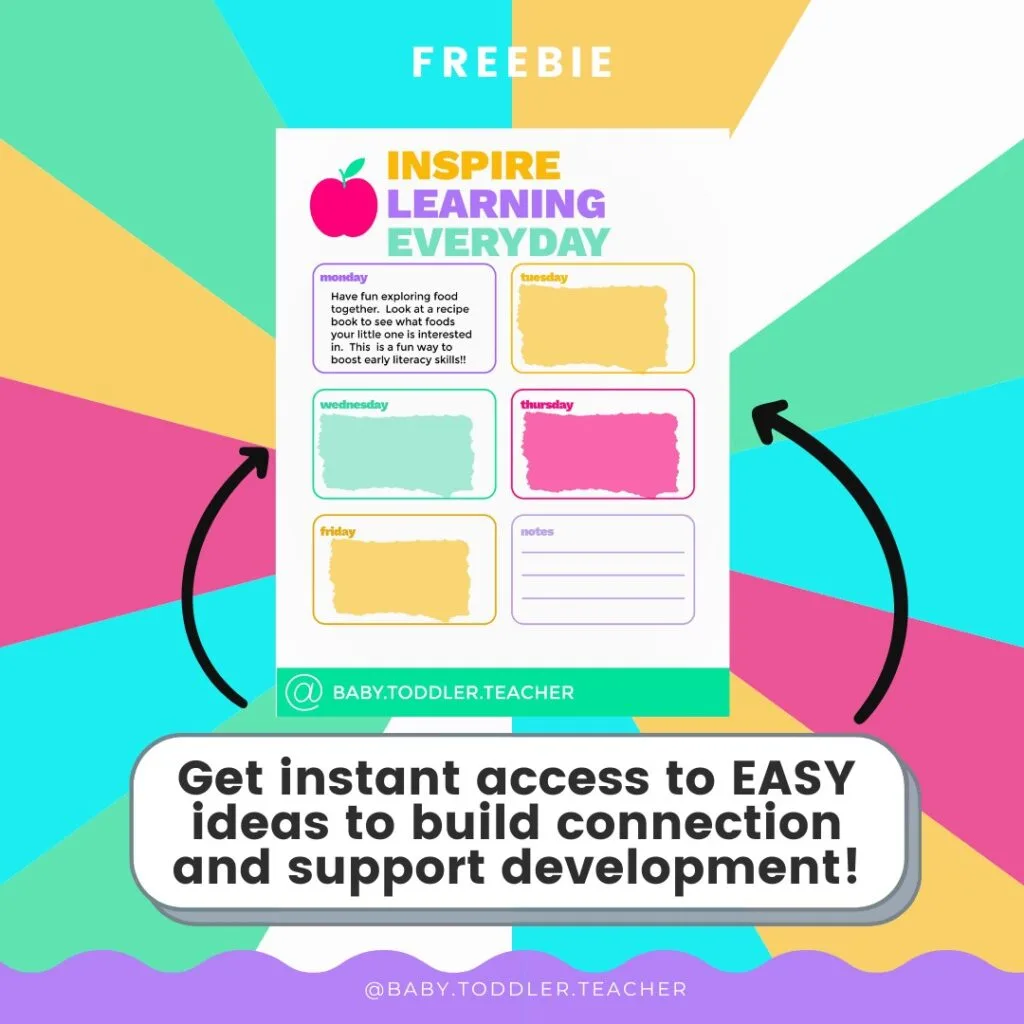When it comes to toddler behavior, one of the most frustrating things for parents is when their child starts throwing food.
With my first child, we had to put a shower curtain on the floor because there was so much food on the floor.
With my second, we got a dog and she took care of all the dropping food from the highchair!
It can seem like a deliberate act of defiance, but in most cases, there’s a reason behind it.
As a Developmental Therapist that specializes in babies and toddlers, and as a mom of two I can help you navigate this toddler behavior!
In this article, we’ll explore why toddlers might start throwing food and offer solutions to how to stop it.
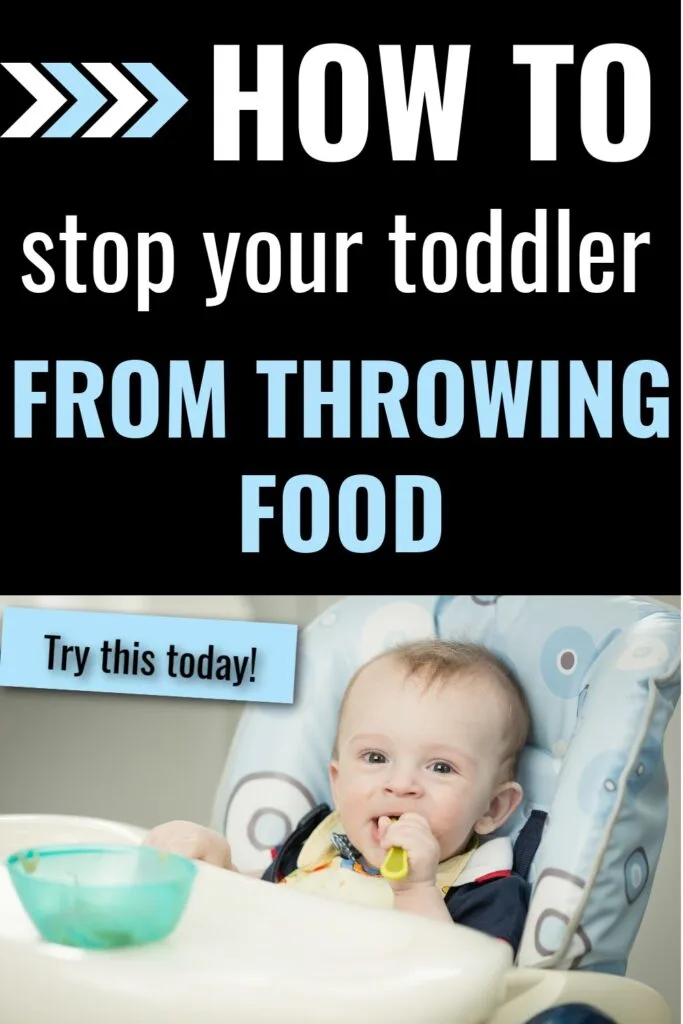
(This post may contain affiliate links. To read our full disclosure policy click here.)
Why do toddlers throw food?
It’s very normal for babies and toddlers to throw food during mealtimes.
They’re exploring their surroundings and discovering new things about the world.
Plus, they’re still learning how to use utensils properly.
Let’s take a closer look at what little ones learn and why throwing food happens.
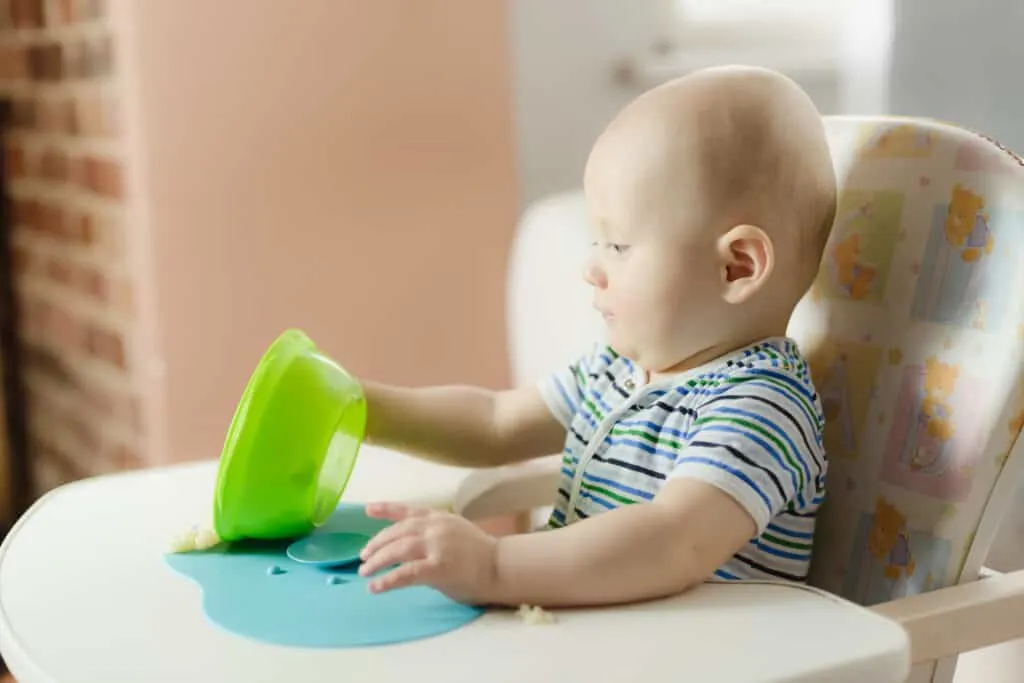
Throwing Food Helps Them Explore Cause and Effect
Toddlers are naturally curious and love to explore their surroundings.
One way they can learn about cause and effect is by throwing food.
When they throw their food, they’ll see that it falls to the ground.
This helps them understand that when they throw something, it will go down, not up.
They may also notice that when they make a louder noise, the food falls faster.
When they throw food, they see firsthand how their actions can result in the desired outcome.
For example, if they throw a piece of bread, they may see it land on the floor and be eaten by the dog.
This experience can help them understand that their actions have consequences and that they need to be mindful of what they do.
Communicating that they have Unwanted Food
For some children, throwing food may be a way of communicating that they don’t want what’s on their plate.
It’s perfectly normal for children to be choosy about what they eat.
In fact, it’s not uncommon for kids to go through periods where they’re particularly picky about certain foods.
It may be that they are full and don’t want anymore, or that they don’t like the taste of what’s on offer.
Don’t worry….we will be giving you some tips on how to handle this soon!
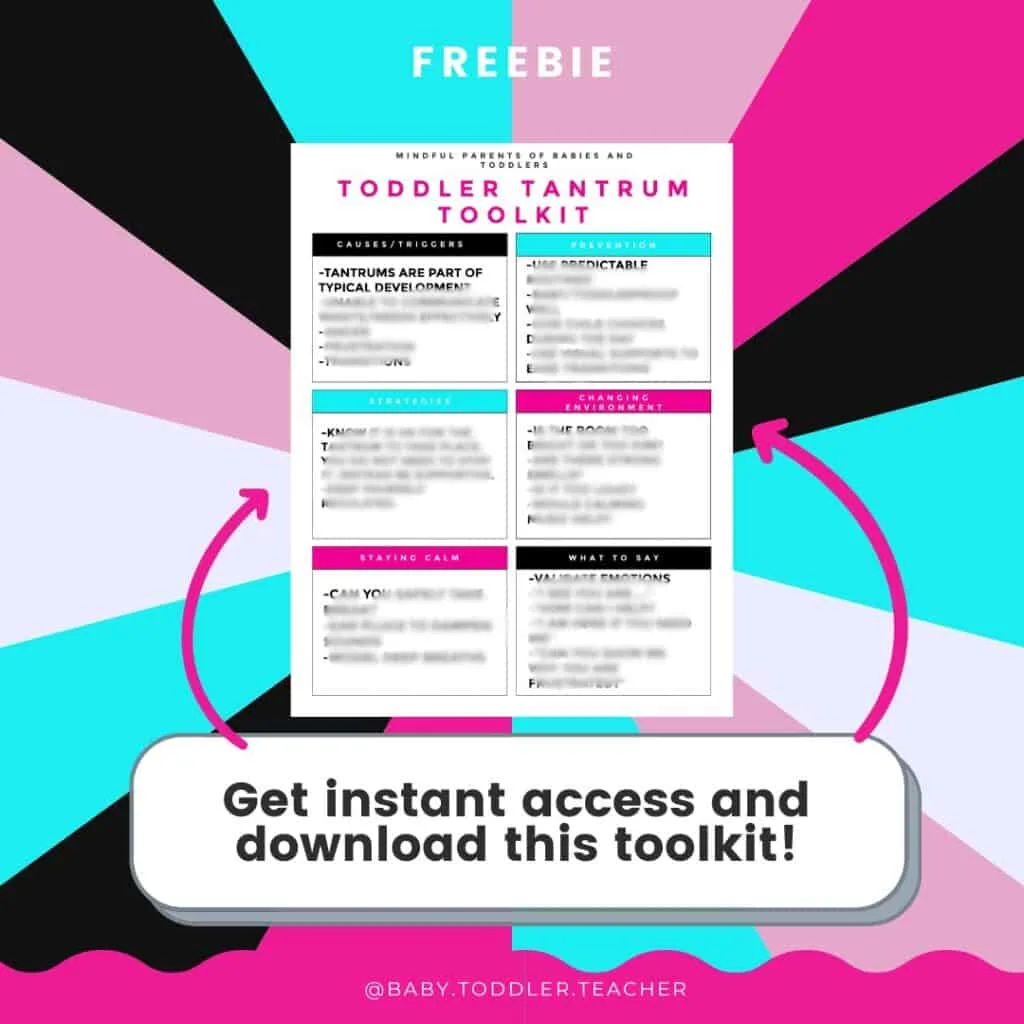
Toddler’s Food Throwing is Actually a Skill!
When toddlers throw food, they are practicing their fine motor skills.
They are learning how to control the muscles in their hands and wrists, and how to use them to apply force.
This is an important skill that will help them as they begin to explore their world and interact with other people and objects.
Toddler Throws Food Because it is Fun!
While it can be tempting to view this behavior as defiant or naughty, it’s important to remember that for toddlers, throwing food is simply a way to explore their surroundings and have fun.
After all, watching mashed peas fly through the air is a lot more exciting than eating them!
So, instead of getting angry, try to see your toddler’s food-throwing antics as an opportunity to teach them about healthy eating habits in a fun and positive way.
With a little patience and creativity, you’ll be able to turn mealtime into a happy learning experience for the whole family.
What can parents do to stop toddlers from throwing food?
It’s feeding time and your toddler is sitting in their high chair, eagerly awaiting their meal.
But as soon as the food hits the tray, they start flinging it onto the floor.
The process is frustrating, messy, and seemingly never-ending.
But there are a few things you can do to try and curb this behavior.
Let’s look at some strategies that you can try out today!
Keep in mind that consistency is important and sometimes you will need to try a strategy more than once.
Take a Deep Breath and Stay Regulated!
When your toddler is throwing food, it can be tempting to overreact.
However, it is important to stay calm and regulated in order to achieve the desired result.
Overreacting will only serve to escalate the situation and make it more difficult to get your toddler to stop throwing food.
Instead, try to remain calm and matter-of-fact.
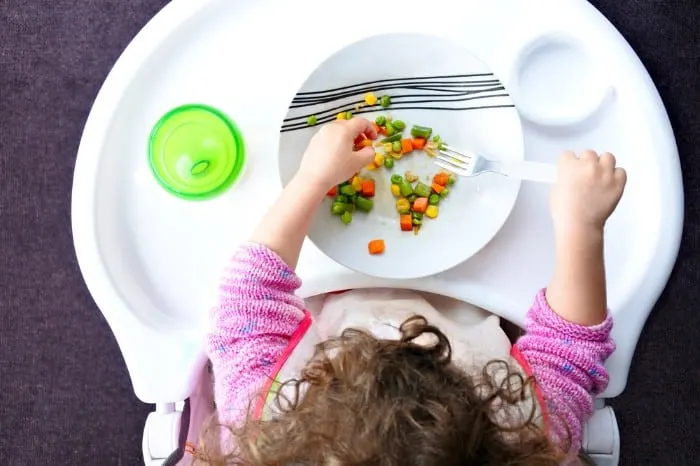
Be Mindful of How Much Food is On the Plate
It can be tempting to load your toddler’s plate with food, especially if they are a picky eater.
However, it’s important to make sure that there is only a small amount of food on the plate.
Toddlers can become overwhelmed by a large amount of food, and this can lead to them throwing the food on the floor.
When serving food to your toddler, start with a small amount and let them ask for more if they are still hungry.
This will help to prevent them from becoming overwhelmed and will encourage them to eat more slowly and carefully.
Give Them a Place for Unwanted Food
One of the best ways to keep your child from throwing their food on the floor is to give them a small bowl to discard it in or designated a place on their highchair tray.
This will let them know that it is okay to let go of the food and that it doesn’t have to go in the trash can.
Also, if you have a lot of food, you can put it in the fridge for later.
This way, your child won’t be able to get to it and will be less likely to throw it on the floor.
Lastly, if you see your child getting ready to throw their food on the floor, you can intervene and help them put it in the bowl.
This will show them that you are there to help and that they don’t have to do it all by themselves.
With a little patience and understanding, you can help your child learn not to throw their food on the floor.
Include Them in Clean Up When They are Finished Eating
As any parent knows, toddlers can be messy eaters.
Food often ends up on the floor, making mealtimes a cleanup nightmare.
One way to help prevent this mess is to involve your toddler in the cleanup process.
After meals, ask your child to help clear the table and sweep up any food that has fallen on the floor.
This simple task will teach your child the importance of cleanliness and help to keep your floors clean.
In addition, it will give you a chance to bond with your child while completing a chore together.
So next time mealtime messes have you feeling frazzled, remember that involving your toddler in the cleanup can help to prevent them.
Use Baby Sign Language to Support Communication
One of the benefits of using baby sign language is that it can help your toddler communicate during mealtimes.
This can lead to fewer tantrums and less food being thrown on the floor.
Some simple signs to use during mealtimes include “more”, “all done”, and “drink”.
You can also use signs to ask your toddler if they would like something different to eat or drink.
By using baby sign language, you can help your toddler communicate their needs and wants, leading to a more enjoyable mealtime for everyone.
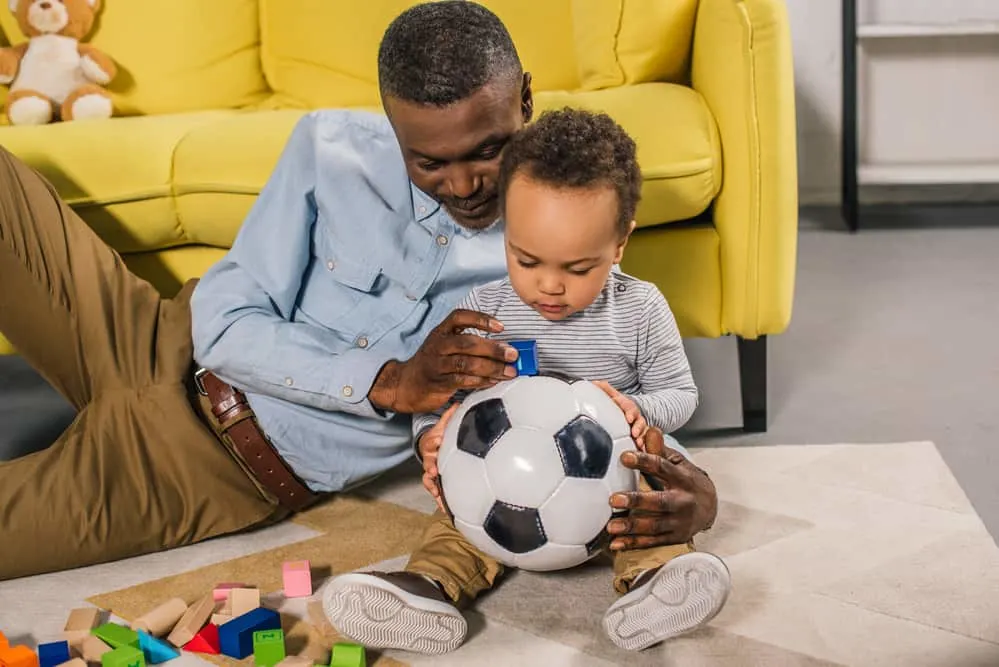
Give Your Child Other Opportunities to Practice Throwing
One way to help your child practice throwing Less food is to provide opportunities for them to practice throwing throughout the day.
For example, you could set up a toy basket and let them practice throwing soft toys into it.
Or, you could have them help you with chores that involve throwing, such as taking out the trash or sorting laundry.
Not only will this help them practice their fine motor skills, but it will also give them a sense of satisfaction from being able to help with tasks around the house.
In addition, you can encourage them to throw balls or beanbags back and forth with you or another family member.
This is a great way for them to get some exercise while also practicing their throwing skills.
By providing these opportunities for practice, you can help your child learn how to control their movements and reduce the amount of food they throw at mealtimes.
RELATED POST: The Best Ideas to Entertain your Busy Toddler at Home
Know that Food Play is Just a Phase!
Toddlers have a lot of energy and they’re still learning how to control their bodies.
So it’s no surprise that playing with food and throwing it is just a phase.
Avoid doing punishments like time out as your toddler is just learning and exploring.
The good news is that it will improve over time.
Just be patient and keep offering healthy meals and snacks.
Eventually, your toddler throwing food will end and they will learn to eat without making a mess. And in the meantime, try to enjoy the messy fun!
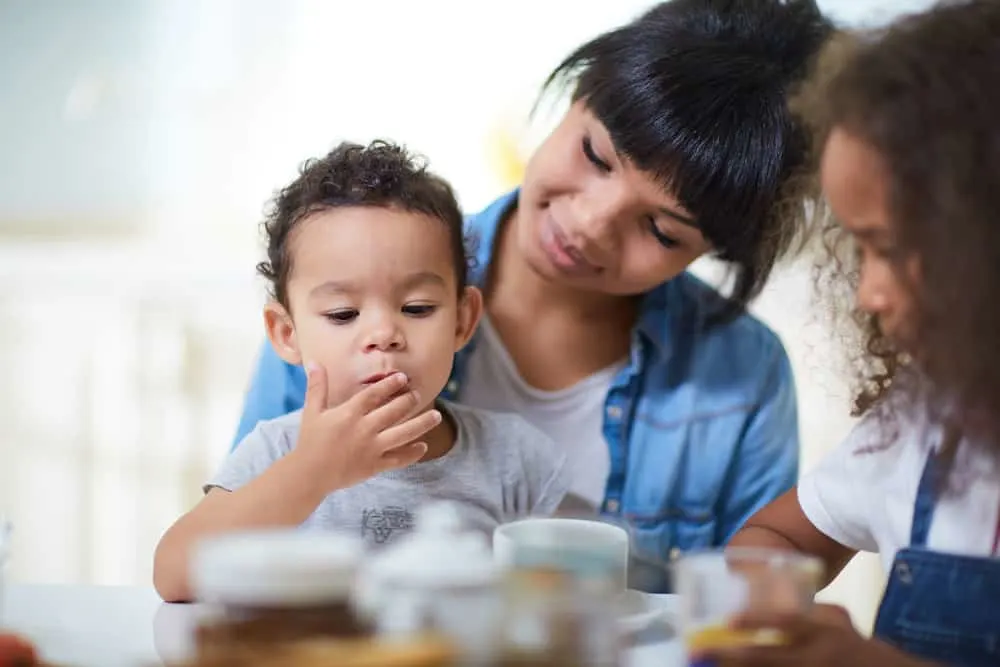
Be Patient with Your Toddler
Toddlers throwing food on the floor is a common occurrence and usually just a phase they are going through.
There are, however, some strategies you can put in place to make it happen less.
These include using baby sign language to support communication, giving your child other opportunities to practice throwing, offering a discard bowl, and knowing that food play is just a phase.
With a little patience and understanding, you can help your toddler learn not to throw their food on the floor.
Frequently Asked Questions
You can try lots of strategies to prevent your toddler from throwing food. For example, involve them in the cleanup process after meals, use baby sign language to support communication, give your toddler other opportunities to practice throwing, offer a discard bowl so they have a safe space for their food, and know that food play is just a phase.
Food throwing is a very common behavior in babies and toddlers learning to eat. It is usually just a phase and will improve over time. The key is to be patient and understanding, and use the strategies above to help your toddler learn not to throw their food on the floor.
It is important to keep in mind that all toddlers are different so food throwing will end when your child has independent eating skills. With patience and practice, your toddler will eventually be able to eat without making a mess. Until then, try to enjoy the messy fun!
Related Posts You Will Enjoy
How to Deal with Toddlers that Wake Up Early
Simple Activities to Promote Sharing and Turn-Taking in Young Children
How to Get Your Toddler to Listen Without Yelling
Toddler Hates Car Seat? Try This!
Wind Down Activities for Toddlers
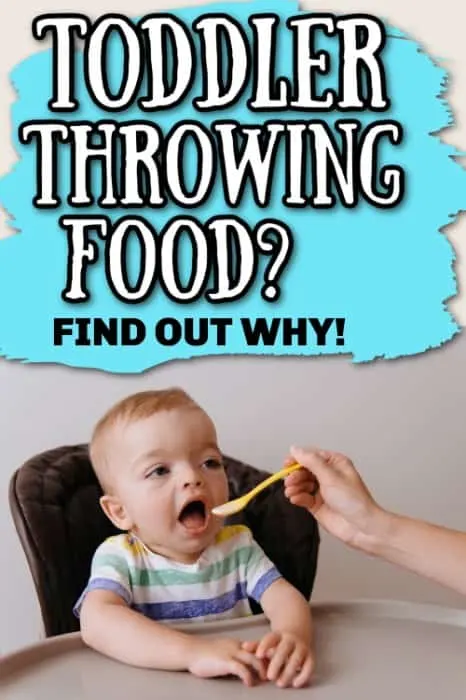

Kayla O’Neill has a master’s degree in education as well as a bachelor’s degree in special education with an emphasis in early childhood education. She has been working as a developmental therapist with babies and toddlers in early intervention since 2012. She is also a mom with two young children.
